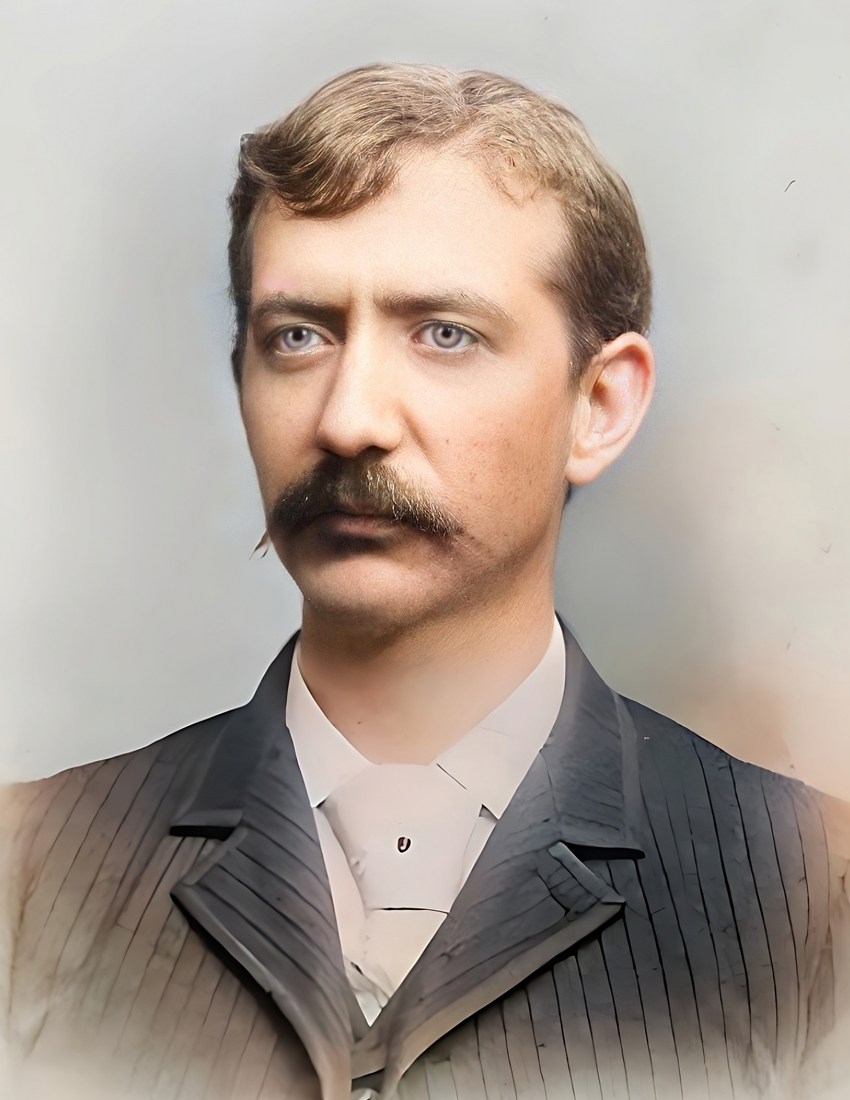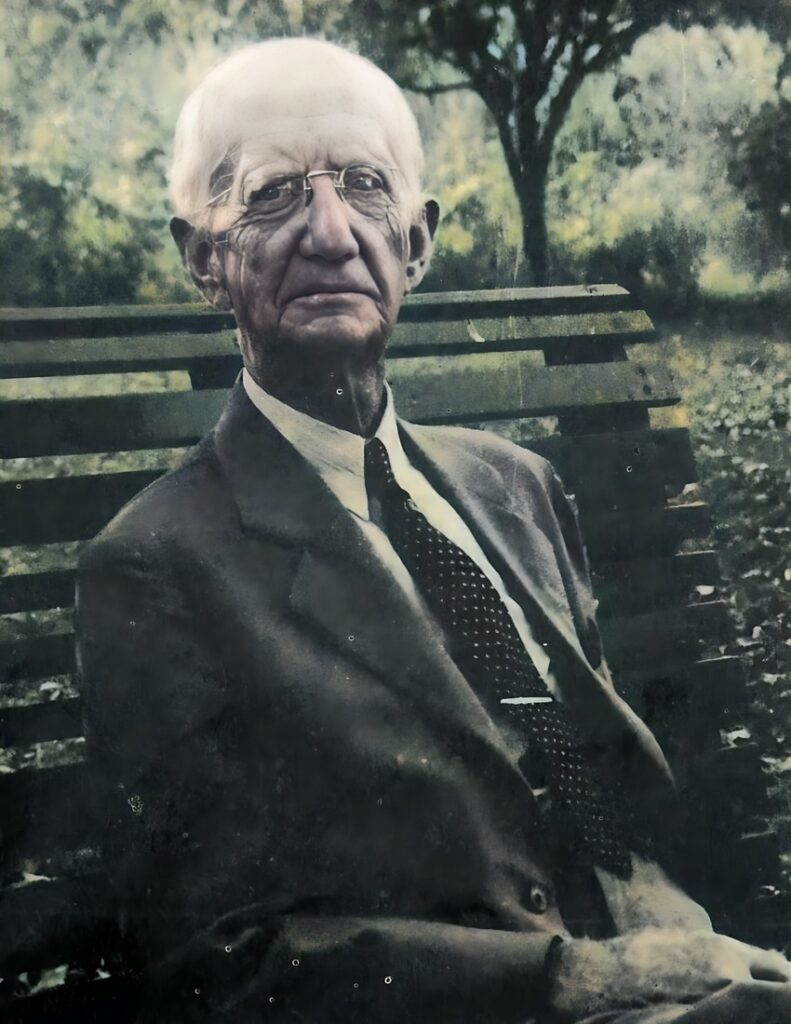Born: July 29, 1866, Franklin, KY.
Died: February 29, 1960, Ocean Grove, NJ.
Buried: St. Thomas Whitemarsh Episcopal Church Cemetery, Whitemarsh, PA.
Thomas Obadiah Chisholm

Hymns by Thomas Chisholm
From Humble Beginnings to a Life of Service
Thomas Obadiah Chisholm was born on July 29, 1866, in a simple log cabin near Franklin, Kentucky. Growing up in a “dirt poor” family, Chisholm faced many challenges and had limited access to education. Despite these obstacles, he attended a small country school and, remarkably, was appointed as the teacher of that very school at the tender age of 16. This early recognition of his abilities and character foreshadowed the impact he would have throughout his life.
Chisholm’s sharp mind and dedication led him to become the associate editor of his local newspaper, The Franklin Favorite, at the age of 21. His talent for writing was evident early on, as he contributed poetry to the Louisville Courier-Journal and was even chosen as the poet for the Kentucky Press Association.
A Transformative Encounter and a New Path
In 1893, at the age of 26, Chisholm’s life took a pivotal turn when he attended a revival meeting conducted by Dr. Henry Clay Morrison, the founder of Asbury College and Theological Seminary. It was during this meeting that Chisholm became a Christian, and his newfound faith would shape the course of his life from that moment on.
Seeing great potential in the young man, Dr. Morrison invited Chisholm to move to Louisville, Kentucky, and become the editor of his publication, The Pentecostal Herald. Chisholm accepted the offer and threw himself into his work, allowing his exposure to Dr. Morrison’s ministry to deepen his own spiritual journey.
Ministry, Health Struggles, and a Life of Writing
Chisholm’s growing passion for ministry led him to be ordained in the Methodist Church in 1903. He was appointed to a congregation in Scottsville, Kentucky, but his frail health quickly proved to be a significant obstacle. After just one year, Chisholm was forced to leave the ministry due to his physical limitations.
Undeterred, Chisholm moved his family to a farm in Winona Lake, Indiana, and later began a career as an insurance salesman. Despite the challenges he faced, Chisholm’s love for writing never wavered. He continued to compose poetry and hymns, submitting them to various religious periodicals. Over the course of his life, Chisholm wrote more than 1,200 poems, many of which were published in prominent publications such as the Sunday School Times, Moody Monthly, and Alliance Weekly.
Learning from a Hymn-Writing Legend
As Chisholm honed his craft, he sought guidance from one of the most renowned hymn writers of the time: Fanny Crosby. He sent his early hymns to Crosby for critique, and she graciously returned them with kindly suggestions and words of encouragement. This support from such a well-respected figure in the world of hymn writing undoubtedly bolstered Chisholm’s confidence and dedication to his work.
Chisholm’s first successful hymn was “O, to Be Like Thee,” which showcased his aim to magnify the Word of God by incorporating as much Scripture as possible, either literally or in paraphrase. He strove to avoid flippant or sentimental themes, instead choosing subjects from the rich storehouse of the Bible.
The Birth of a Timeless Hymn
In 1923, Chisholm sent several of his poems, including “Great Is Thy Faithfulness,” to his friend William Runyan, an editor at the Hope Publishing Company and a music minister associated with the Moody Bible Institute. Runyan was particularly moved by this poem and earnestly prayed that the tune he composed would carry the message in a worthy manner.
Chisholm later revealed that there was no specific circumstantial background for “Great Is Thy Faithfulness,” but rather a simple, daily realization of God’s unwavering faithfulness. Runyan and Chisholm’s collaboration proved to be a remarkable success, as evidenced by the hymn’s enduring popularity.
The hymn quickly became a favorite at the Moody Bible Institute, thanks in part to its frequent use by the school’s president, Dr. Will Houghton. Over time, “Great Is Thy Faithfulness” became the unofficial hymn of the institute, beloved by students and faculty alike.
A Life Marked by God’s Faithfulness
Throughout his life, Chisholm faced numerous challenges, including poverty and poor health. Yet, he remained steadfast in his faith, recognizing God’s unwavering faithfulness in his life. In a letter written when he was 75, Chisholm reflected on his experiences:

Chisholm’s humble spirit and deep appreciation for God’s goodness are evident in the way he sometimes described himself as “just an old shoe.” Despite his remarkable contributions to Christian hymnody, he remained grounded in his faith and dedicated to sharing the message of God’s love through his writing.
A Legacy of Faith and Inspiration
Thomas Obadiah Chisholm passed away on February 29, 1960, at the age of 93. Although he is no longer with us, his legacy lives on through the powerful words of “Great Is Thy Faithfulness” and the many other hymns he wrote throughout his life.
Great is Thy faithfulness, O God my Father;
There is no shadow of turning with Thee;
Thou changest not, Thy compassions, they fail not;
As Thou hast been, Thou forever will be.
These timeless lyrics continue to inspire and comfort believers around the world, serving as a testament to Chisholm’s unwavering faith and the enduring power of his words. His life story reminds us that no matter our circumstances or the challenges we face, we can always find hope and strength in the faithfulness of our loving God.
As we sing the hymns born from Thomas Obadiah Chisholm’s heart, let us remember the man behind the words—a humble servant who dedicated his life to sharing the goodness and grace of God with all who would hear. May his legacy continue to encourage generations to come, reminding us that, in the words of his most famous hymn, “Morning by morning new mercies I see; All I have needed Thy hand hath provided; Great is Thy faithfulness, Lord, unto me.”

